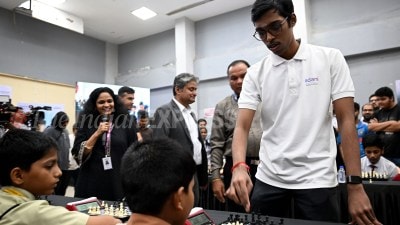The man who would not be AG
H.M. Seervai, who would have turned hundred today, brought a rare conviction to crucial constitutional cases

On December 5 2006 H.M. Seervai would have completed 100 years. He died on January 26 1996. It was the end of an era.
For more than 50 years Seervai was the country’s foremost constitutional lawyer, and an erudite scholar. The author of a monumental work on constitutional law of India that even today is referred to as an authority in the courts in India, he held the post of advocate-general of Maharashtra for 17 years. His integrity, courage and conviction gave him a unique stature in public life.
In many respects Seervai the man was greater than Seervai the lawyer, but the two characters were inextricably mixed, giving him that indefinable eminence over several lawyers of his day who were reputed to be cleverer and more astute than he.
His detachment from politicians and politics gave him his high stature as advocate general. He defended government cases in court, refusing any other brief until it was completed. He declined to defend policies of the government that he felt were against his convictions, such as when the government banned the teaching of English in Anglo-Indian schools, and the putting up of a “martyrs memorial” in Bombay in the cause of the linguistic state of Maharashtra.
Seervai’s annual income would have put a junior to shame. When he was told it would not be wrong to take high fees if clients were willing to pay them, Seervai retorted, “If a man was willing to be robbed would you be a thief?”
His invincible faith in rationality and the ultimate triumph of right and justice, made me think he was naïve and unworldly, but I have come to believe that he was not wrong.
The rare courage of his conviction was manifest from his early days. Even as a junior he would not hesitate to expose judges he felt were partial. He was outspoken in his criticism of some of the judgments of the Supreme Court boldly stating that they were “productive of great public mischief and ought to be overruled”. In his book Partition of India — Legend and Reality, Seervai demolished popular notions of the role of national leaders in the partition of India. At times, Seervai’s perception of matters was misguided but it was his sincerity that let them acquire a legitimacy of their own.
His most brilliant performance was in the parliamentary privileges case in the Supreme Court in 1964. He was specially selected to plead the case of the UP Vidhan Sabha in a contest between the legislature and the judiciary because it was believed that only he would be able to tell the judges that they did not have the powers over the legislature. This he did without hesitation. In an electrifying moment in court, he told Justice Subba Rao that the court’s order would be disregarded as a nullity if the court exceeded its jurisdiction.
In 1972, Government of India chose Seervai as the leading counsel in precedence over the attorney-general to defend Parliament’s power to amend the Constitution in the Kesavananda Bharati case before the largest bench — of 13 judges — of the Supreme Court ever constituted.
Seervai argued with great vehemence for 22 days that Parliament had the power to amend the Constitution without any limit. Six judges accepted his view; but the majority held that Parliament could amend the Constitution but not alter the basic structure of the Constitution. However, after the misuse of the amending power during the Emergency in 1975, Seervai changed his view and later stated that there had to be limitations on Parliament’s power to control the Constitution. Seervai had the intellectual courage to change his view.
Recognition of his eminence came in many ways. He was offered judgeship of the Supreme Court twice. Each time, he declined. He was conferred the Padma Vibhushan in 1972. The International Bar Association declared Seervai a Living Legend of Law. However, the most fitting recognition of his eminence was the Government of India’s offer to appoint him the Attorney-General for India in 1971. Declining the office with thanks, he wrote to the law minister that the best contribution that he could make to the law was to “embody in successive editions of his book the correct judicial interpretation of the Constitution.” We shall not see the likes of Seervai again.
The writer is a senior advocate of the Supreme Court and former Solicitor-General of India
- 01
- 02
- 03
- 04
- 05































